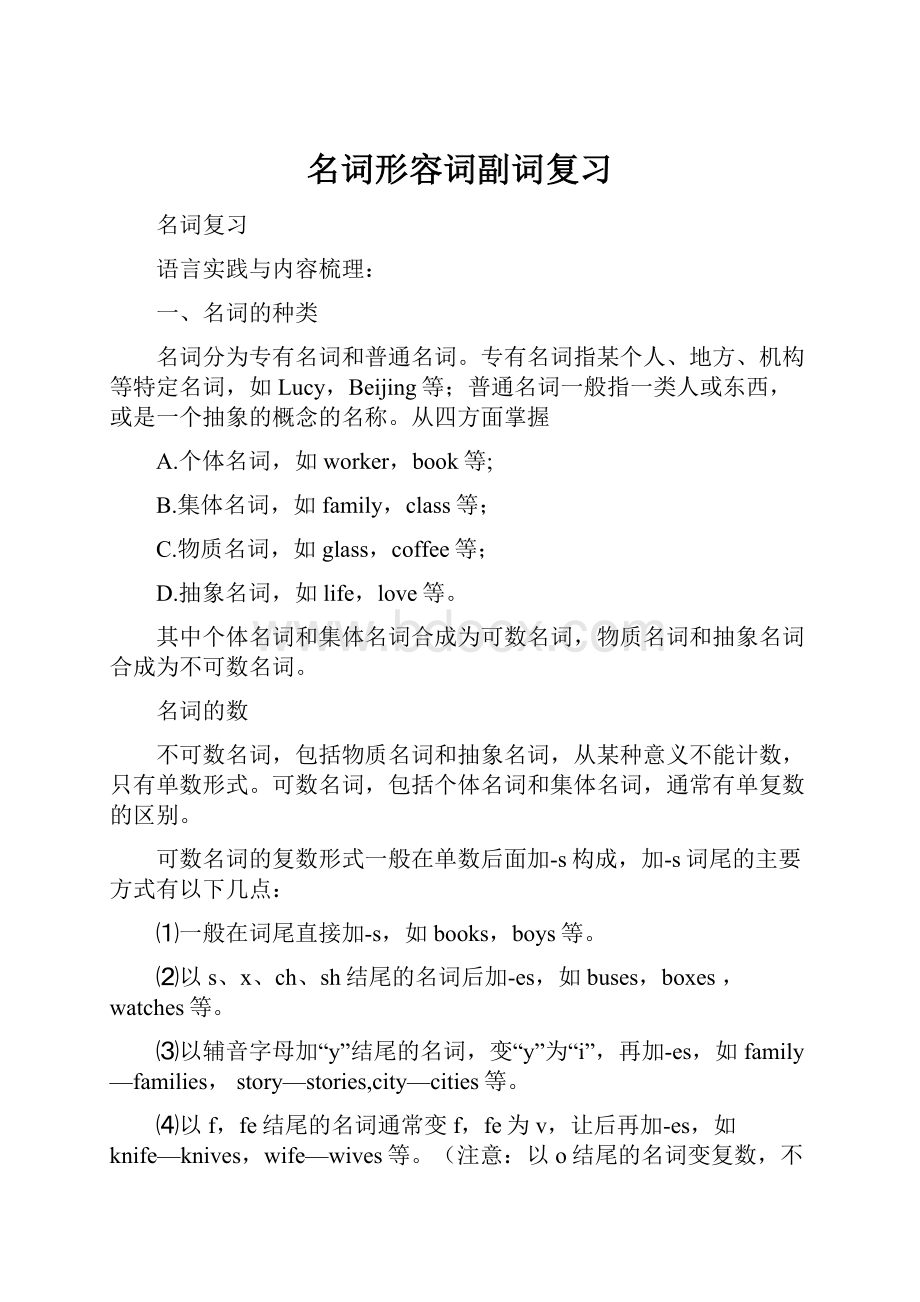名词形容词副词复习.docx
《名词形容词副词复习.docx》由会员分享,可在线阅读,更多相关《名词形容词副词复习.docx(12页珍藏版)》请在冰豆网上搜索。

名词形容词副词复习
名词复习
语言实践与内容梳理:
一、名词的种类
名词分为专有名词和普通名词。
专有名词指某个人、地方、机构等特定名词,如Lucy,Beijing等;普通名词一般指一类人或东西,或是一个抽象的概念的名称。
从四方面掌握
A.个体名词,如worker,book等;
B.集体名词,如family,class等;
C.物质名词,如glass,coffee等;
D.抽象名词,如life,love等。
其中个体名词和集体名词合成为可数名词,物质名词和抽象名词合成为不可数名词。
名词的数
不可数名词,包括物质名词和抽象名词,从某种意义不能计数,只有单数形式。
可数名词,包括个体名词和集体名词,通常有单复数的区别。
可数名词的复数形式一般在单数后面加-s构成,加-s词尾的主要方式有以下几点:
⑴一般在词尾直接加-s,如books,boys等。
⑵以s、x、ch、sh结尾的名词后加-es,如buses,boxes,watches等。
⑶以辅音字母加“y”结尾的名词,变“y”为“i”,再加-es,如family—families,story—stories,city—cities等。
⑷以f,fe结尾的名词通常变f,fe为v,让后再加-es,如knife—knives,wife—wives等。
(注意:
以o结尾的名词变复数,不同的语法教材对此规定不一。
为记忆方便,一般认为:
初中教材常见的单词,如tomato—tomatoes,potato—potatoes。
其他photo—photos,radio—radios,piano—pianos,kilo—kilos,zoo—zoos等。
)
少数名词有不规则复数形式,如:
man—men,woman—women,foot—feet,child—children,tooth—teeth,mouse—mice等。
一些名词单复数形式相同,如Chinese,Japanese,deer,sheep,people,cattle,fish等。
还有些名词通常以复数形式出现,如clothes,glasses,thanks,noodles等。
在twomendoctors,somewomennurses这类短语中更要注意此处的men,women的用法问题了。
二、名词的格
名词的格,分主格、宾格以及所有格。
名词主宾格在句法上没有拼写区别,一般不作为学习的重点。
名词的所有格指有些名词可以在后面加’s来表示所有关系。
如露西的书包,Lucy’sbag。
名词的所有格一般在后面加’s,如上例,还有一些其他表现形式
⑴一个名词如其复数形式以s结尾,直接在s后打“’”,如thestudents’books。
Nurses’DayTeachers’Day
⑵如其复数形式特殊,不以s结尾,在后加’s,如Children’sDay。
Mother’sDaytheteacher’sdesk
⑶如一个东西为两者共有,只在第二者后加’s,表现为AandB’s,例ThisisLilyandLucy’sroom.
⑷如两者分别拥有,则分别加’s,表现为A’sandB’s,如TheseareLily’sandLucy’srooms
名词所有格主要用于表示有生命的东西的名词,但如表示时间、距离、国家、城市、团体等无生命的名词,也可以用在后加’s的方法,如tenminutes’walk,today’snews,thePeople’scinema等。
凡不能加’s的名词,都可以与of构成所有关系,如themapofChina,thenameofthemovie等。
双重所有格是一种特殊形式,of结构与名词所有格-’s结合使用,如afriendofmyfather’s。
of加名词性物主代词也可以构成双重所有格,如afriendofmine。
三、加后缀变名词
A.adj+ness变成名词
illnesssicknessgoodnesssadnessblindnesskindnessrichnessfitnessdarknesshappy-happinessugly-uglinessbusy-businesslazy-laziness
B.V+ion变成名词
attract-attractionact-actioncollect-collection
instruct-instructiondiscuss-discussionsuggest-suggestion
protect-protectionconnect-connection
invent-inventiondecide-decision
pollute-pollutiondonate-donationcelebrate-celebration
educate-educationoperate-operation
invite-invitationorganize-organization
realize-realizationintroduce-introduction
*describe-descriptionpronounce-pronunciation
compete-competition
CV+ing变成名词
meet-meetingclean-cleaningwash-washingfeel-feelingpaint-painting
spell-spelling
say-sayingend-endingmean-meaningtrain-traininghunt-huntingdive-divingskate-skatingski-skiinghike-hikingride-ridingcycle-cyclingswim-swimming
jog-joggingshop-shoppingbegin-beginning
DV/adj+th变成名词
high-height,weigh-weight,long-length,grow-growth,
warm-warmth
(hot—heat,beautiful-beauty,proud-pride,dangerous-danger,
safe-safety,dead—death,angry-anger,hungry—hungerserve-servicepossible-possibility)
E+er/or构成名词
1.加er:
speaker,teacher,farmerreporter,waiter
2.双些词尾加er:
winner,beginner,runner,swimmer
3.有e加r:
writer,dancer
4.加or:
visitor,actordirector,editorinventor,sailor,survivor
5.加(r)ess,actress,hairdress,waitress
6.加ist:
science-scientistpiano-pianisttour-touristart-artisttype---typist
四、名词加后缀变形容词
careful/lessuseful/lesscheerful/lesscolorful/less
helpful/lesshomeful/lesshopeful/lessharmful/lessmeaningful/lessthoughtful/lessthankful/lesspowerful/
tasteful/tasteless(tasty)
wonderfuldelightful
grateful-ungrateful
successful-unsuccessful
peaceful-unpeaceful
endlessnoisy-noiselesssleepless(sleepy)
形容词加前缀构成反义词
1un-able
comfortable
countable
friendly
grateful
happy
helpful
healthy
kind
known
like
lovely
lucky
natural
necessary
selfish
thankful
usual
welcome
willing
certain
popular
important
2in-active
complete
correct
formal
3.ir-regular
4.im-polite
possible
patient
5.dis-abled
like
honest
appear
agree
六、名词变形容词
A单词+y变成形容词
health-healthy
luck-lucky
rain-rainy
snow-snowy
wind-windy
cloud-cloudy
sleep-sleepy
frost-frosty
mist-misty
noise-noisy
taste-tasty
shine-shinyshining
ice-icy
sun-sunny
fun-funny
fog-foggy
B方位名词+ern构成形容词
easternsouthern,western,northern,
七、形容词变副词
(1)直接加ly,especiallycarefullyexcitedly
politelymostly,recently(注意:
true-truly)
(2)以le结尾的形容词去e加y构成副词
possible-possiblysimple-simplyprobable-probablycomfortable-comfortablyterrible-terribly
suitable-suitablyable-ablygentle-gently
(3)以辅音字母加y结尾的单词,改y为i加ly
happy-happilyheavy-heavilyhealthy-healthilynoisy-noisilylucky-luckilyangry-angrily
(4)good-well(better,best)
(5)既可作形容词也可作副词的单词
Wellhardearlyfasthighwideclosenearweekly
(6)compare(比较1):
true-truly,safe-safely
compare(比较2):
hard(adj困难的/adv努力)
hardly(adv.几乎不)
wide(adj宽广的;awideroad)
(adv广阔地,全力地openyourmouthwide)
widely(adv.广泛地,Englishisusedwidely)
close(adj/adv靠近的,亲密的,接近)sitcloseto,aclosefriend
closely(adv.紧密)workcloselywithUNICEF
deepadj深的adeephole
adv.深地digaholedeep
deeplyadv.深深地(感情)Iwasmoveddeeplybythestory.
(7)注意:
有些单词有ly,它不是副词,而是一个形容词
friendly,lovely,likely(可能的),livelylonely,elderly,
用在系动词之后,名词之前。
八、形容词副词的比较级和最高级
(一)形容词、副词比较级和最高级的构成:
1.单音节词和少数双音节词比较级和最高级的规则变化:
规则
原级
比较级
最高级
1.在词尾后直接加-er/est
tall
strict
taller
tallest
2.词尾是e,只加-r/st
nice
nicer
nicest
3.以辅音字母加y结尾的,把y变i再加-er/est
happy
tiny
silly
happier
happiest
4.重读闭音节,末尾只有一个辅音字母,双写这个辅音字母,再加-er/est
thin
sad
fat
slim
thinner
thinnest
2.其他双音节词或多音节词,在该词前面加-more/most
beautiful—morebeautiful—(the)mostbeautiful
3.由形容词加ly构成的双音节词和多音节词,都是在该词前加-more/most.
quickly—morequickly—(the)mostquickly
difficultly—moredifficultly—(the)mostdifficultly
4.不规则变化:
good/well
better
best
bad/badly/ill
worse
worst
many/much
more
most
little
less
least
far
old
farther/
further
older/elder
farthest/
furthest
oldest/eldest
(二)形容词比较级和最高级的用法:
1.原级的用法:
用于两者之间对比,意思为“……和……相同”
A+v.+as….+形容词原级+asB
TomisashonestasJack.
Herskinisaswhiteassnow.
Mydogisasoldasthatone.
Heisnotas(=so)tallasI.
Theweatherhereisnotas(=so)coolastheweatherinHarbin.
2.比较级的用法:
1)A+形容词比较级+than+B
SusanishappierthanJane.
Hisbrotheristwoyearsyoungerthanme.
BeijingismorebeautifulthanOsaka.
形容词比较级前还可以用much,even,still,alittle,far,alot,abit,much/farmore来修饰。
Very,so,too,quite不能修饰比较级,只能加原级。
2)数字+形容词比较级+than
I’mtwoyearsolderthanyou.
Sheisaheadtallerthanme.
3)比较级+and+比较级,表示“越来越……”
Theearthisgettingwarmerandwarmer.
Chinabecomesmoreandmorebeautiful
4)the+比较级,the+比较级结构,表示“越……就越……”
ThemoreIstudyit,themoreIlikeit.
5)which/who+is+比较级,AorB?
Whichcityisbigger,BeijingorTianjin?
Whoishappier,youorme?
6)the+比较级(one)ofthetwo
Lilyisthetaller(one)ofthetwo
Danielchosethecheaper(one)ofthetwowathches.
7)a+比较级+单数或比较级+复数
I’msorry.Thisdressistooexpensive.Doyouhaveacheaperone?
Thesetrousersaretooshort.Wouldyouliketoshowmelongerones?
8)much,far,even,alittle等+比较级
Todayisfoggy.AndI’mafraidtomorrowwillbemuchfoggier.
Youwillhaveaeventastiermealtonightthanyesterdayevening.
3.最高级用法:
1)用于三者及以上的人或事物的比较,最高级前加the,最高级前有物主代词,序数词和名词所有格时,不加定冠词.
Mostpeoplelikeapples.
Mostoftheboysaregood.
Itisournearestneighborinspace.
2)最高级后面跟带in(在某范围内)或of(同一种事物或人)表范围的短语。
Mumisalwaysthebusiestinmyfamily.
Mumisalwaysthebusiestofus
Inspace
Oftheplanets
3)oneofthe+最高级+名词复数
Shanghaiisoneofthemostbeautifulcitiesofthetencities.
Ourcityisoneofthesafestcitiesintheworld.
4)the+序数词+最高级+名词单数
ChangJiangisthefirstlongestriverinChina.
thesecondhighestbuilding
5最高级、比较级、原级之间的转换:
例句
最高级
Sheisthebestinherclass.
比较级
Sheisbetterthananyotherstudentinherclass.
Sheisbetterthantheotherstudentsinherclass.
Sheisbetterthanallherotherclassmates.
Sheisbetterthananyotherofherclassmates.
Nootherstudentinherclassisbetterthanshe.
原级
Nootherstudentinherclassisasgoodasshe.
LessononeisnotaseasyasLessonTwo.
LessonTwoiseasierthanLessonOne
LessonOneismoredifficult/much/alittle/abitharderthanLessonTwo
(三)副词比较级和最高级的用法:
1.原级主要的句型:
1)as+副词原级+as
TomrunsasfastasJones.
notas/so+副词原级+as
Hedidn’tcomeas/soearlyasLiLei.
2)too+副词原级+todosth.
Jeanridestooslowlytocatchupwithme.
3)so+副词原级+that
Jeanridessoslowlythatshecan’tcatchupwithme.
4)副词原级+enoughtodosth.
Jeandoesn’tridefastenoughtocatchupwithme.
2.比较级的用法:
1)比较级+than。
当前后使用的动词相同时,通常用助动词来代替后面的动词,该动词或助动词可以省略。
LilyrunfasterthanMary(did).
2)比较级+and+比较级
Thedaysaregettinglongerandlongerinsummer.
3)themore…themore…
Theharderyouwork,thebetteryouwilllearn.
3.最高级的用法:
副词最高级前一般有the,也可省略。
Heworks(the)hardestofallthestudentsintheclass.